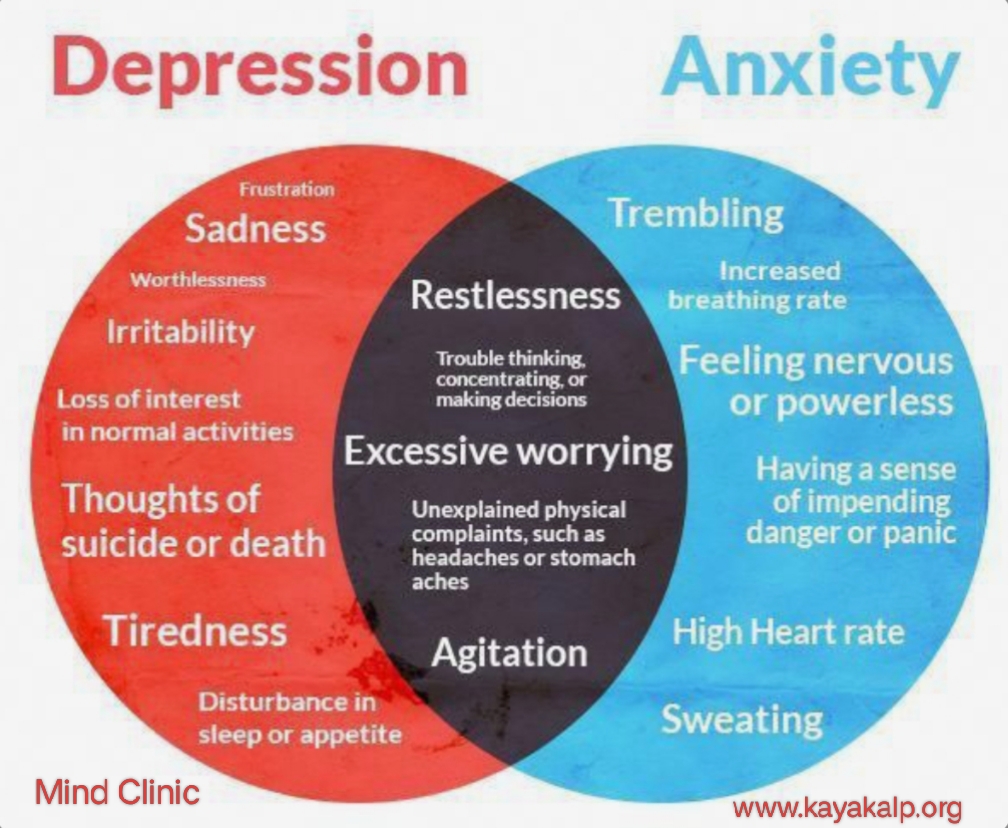Anxiety & Depression

MANAGING HAPPINESS WITH AYURVEDA
By DR. SUNEET AURORA, BAMS, PGDHH (Apollo Hospt. Hyd)
General Counselling / Psychotherapist / Life Coach
By KRITIKA ARORA, MA (Psychology), Clinical Psychotherapist
Sources: J Ayurveda Integr Med. 2021 May 20;12(2):378–383. doi: 10.1016/j.jaim.2021.03.012
Major mental issues in daily OPD practice are seen as cases of Anxiety & Depression.
Generalized ANXIETY disorder (GAD) is a mental health condition that involves excessive and persistent feelings of fear and worry. These feelings can interfere with daily life.
Symptoms of GAD (Anxiety disorder) are- Excessive worrying or fear, Feeling tense, irritable, or restless, Difficulty concentrating or making decisions, Nausea or abdominal distress, Heart palpitations, Sweating, trembling, or shaking, Trouble sleeping, Feeling lightheaded or dizzy, Low mood or depression
Types of anxiety disorders:
Generalized anxiety disorder (GAD)
Panic disorder
Social anxiety disorder
Phobias, such as agoraphobia and claustrophobia
Obsessive-compulsive disorder
Separation anxiety disorder
Illness anxiety disorder
AYURVEDA considers Anxiety as VATA-UNMAD, with Air element predominantly palying to create imbalance in thoughts.
Major Depressive disorder (MDD) is a chronic, episodic disorder which manifests with disturbance in mood, interest, cognition and vegetative symptoms. It has major impact on the quality of life of the patients, by affecting their physical, mental, personal, social, and spiritual wellbeing. Vishada and avasada represents minor depressive episodes and MDD can be equated to Kaphaja Unmada (involving kapha-dominant vata and tama dosha).
Considering the impact of depression, the World Health Organisation declared slogan of World Health Day 2017 as “Depression–Let's talk”. Prevalence in India is high and 48.5 million people are affected. Depression has 2.1 times higher prevalence in women than men. An epidemiological study showed the prevalence of substance abuse, namely alcohol abuse (4.8%), alcohol dependence (4.5%), cannabis abuse (2.5%) and dependence (2.9%), other drugs abuse (2.3%) and dependence (2.9%) among MDD patients. Suicidal attempts among patients with MDD was found to be 30–40%. MDD is associated with an increased risk in development of diabetes mellitus, heart disease and stroke.
Current interventions include both pharmacological and psychological aspects. Moderate to severe depression needs to be treated with medication or combination of medications and psychotherapy.
Treatment comprises of initial and maintenance phases. Initial phase lasts for approximately 6 months while the mean maintenance phase lasts for 9–12 months. Initial phase is aimed at remission and restoration of psychosocial functioning while maintenance phase aims to prevent recurrence of symptoms.
First line therapy should be Psychotherapy/ Counselling with added Ayurveda medicines as Jyotishmati, Brahmi, Ashwagandha, etc.
Various psychotherapies including cognitive behaviour therapy, interpersonal therapy, behavioural activation therapy, psychodynamic therapy, problem-solving therapy, and mindfulness-based therapy have been found to be beneficial.
When to start anti-depressants:
Pharmacopial drugs should be tried in severe anxiety / depressive attacks when there is suicidal tendency, or the patient is closed to psychotherapy. However, conventional anti-depressants have demonstrated various adverse events like sedation, tremors, sexual dysfunction, and weight gain. Studies have shown that anti-depressants have low adherence rate due to patient concerns about dependency and side effects.
AYURVED & ANXIETY-DEPRESSION
In Ayurveda, MDD can be closely related to Kaphaja Unmada in severe cases and in mild cases to vishada and avasada. In severe cases, derangement of Kapha pradhana tridosha and in mild cases Kapha vataja derangements are observed. In Ayurveda texts, scattered information on mental derangements and treatments is available. Vishada is mentioned to be one of the vataja natatmaja vikara. Manasika dusti involved is Tama pradhana raja dosha. Vishada is more prevalent in hina satwa purusha (decreased mental strength) (C.S.Vi.8.119).
Symptoms include avasada (derangement) of manas (mind) (C.S.Su.16.14, C.S.Su.25.40), vak (speech), kaya (body). Presence of vishada aggravates co-existing disease conditions (C.S.Su.25.40). Ayurveda approach for depression is as per Kaphaja Unmada. In vataja manifestations, vataja unmada chikitsa is also incorporated. According to the condition vamana, snehapana, snidga virechana, sarvanga bahyanga, mastiskya chikitsa can be beneficial. Integration of Panchakarma, oral medications, satwawajaya, daiwivyapashraya also can play an important role in the comprehensive management of MDD.
Management was planned with integrative treatment comprising of
1. Yukti vypasharaya (pharmacological)
2. Satwawajaya(counselling) and
3. Daiwivyapashraya (spiritual-based techniques).
Management is done with :
1. snehapana (internal oleation),
2. virechana (gut cleansing),
3. sarvanga abhyanga (massage of whole body with medicated oil), followed by
4. bashpa sweda (steam therapy to whole body),
5. shirodhara (dripping of medicated oil on fore head),
6. shiropichu (transcranial drug administration by placing cotton pad dipped in medicated oil),
7. satwavajaya chikitsa, (holistic counselling & meditation), and
8. daiwi vyapashraya chikitsa (spiritual guidance in people with faith)
In Yukti vyapashraya (medicine treatment), we use Kayakalp MEDHA-KALP, Kayakalp UNMAD-HAR, Kayakalp NIDRA-KALP, Kayakalp Ashwagandha plus , Kayakalp Jyotishmati plus etc.
Note:
Treatment kit for Anxiety-Depression can be delivered to your doorstep after online consultation.
For online consultation / online counseling therapy:
Call 0161-5028269; Whatsapp +91 7589001373; e mail: [email protected]
